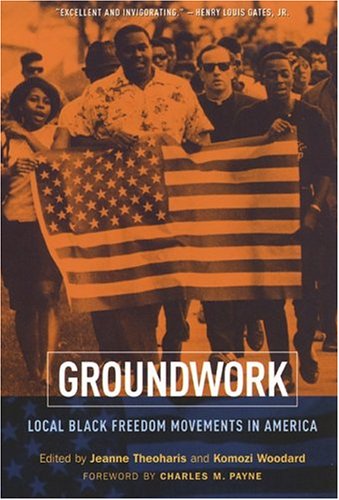View the Table of Contents. Read the Foreword.
"The thirteen essays in this important collection examine grass-roots struggles for racial justice throughout the United States from 1940-1980...Read together, these essays remind us that activism changes people as much as society."
Journal of American History
"The essays in Groundwork assert individually and collectively that at the root of any national movement for change are local activists working from the bottom up to change their communities first, then the world. This excellent and invigorating collection is crucial reading in an election year."
Henry Louis Gates, Jr., Director, W. E. B. Du Bois Institute for African and African American Research, and author of America Behind the Color Line: Dialogues with African Americans
"A major contribution to the ever expanding historical literature of the modern African American freedom struggle. This book brings together outstanding examples of detailed and thoughtful studies of northern as well as southern local movements."
Clayborne Carson, Professor of History and Director, Martin Luther King, Jr. Papers Project, Stanford University
"Brilliantly conveys the vibrancy and creativity of community-based movements that transformed America's racial and civic landscape in the decades following World War II."
Patricia Sullivan, author of Freedom Writer: Virginia Foster Durr, Letters from the Civil Rights Years
"Required reading for anyone who wants to understand what the Civil Rights Movement actually was - a national movement conceived and executed by local people in cities and towns across this country. They are the people who made the movement that made Martin Luther King, Jr.--not the other way around."
Julian Bond, Professor of History, University of Virginia, American University, and Chairman of the NAACP
"This work demonstrates again and again how local movements complicate the standard civil rights narrative of nonviolence, black power, busing, and the nature of leadership."
Tracy E. K'Meyer, Associate Professor US History, University of Louisville
"These essays enrich understanding of the valiant struggles to make real the promise of a more democratic US."
CHOICE, highly recommended
Over the last several years, the traditional narrative of the civil rights movement as largely a southern phenomenon, organized primarily by male leaders, that roughly began with the 1955 Montgomery Bus Boycott and ended with the Voting Rights Act of 1965, has been complicated by studies that root the movement in smaller communities across the country. These local movements had varying agendas and organizational development, geared to the particular circumstances, resources, and regions in which they operated. Local civil rights activists frequently worked in tandem with the national civil rights movement but often functioned autonomously fromand sometimes even at odds withthe national movement.
Together, the pathbreaking essays in Groundwork teach us that local civil rights activity was a vibrant component of the larger civil rights movement, and contributed greatly to its national successes. Individually, the pieces offer dramatic new insights about the civil rights movement, such as the fact that a militant black youth organization in Milwaukee was led by a white Catholic priest and in Cambridge, Maryland, by a middle-aged black woman; that a group of middle-class, professional black women spearheaded Jackson, Mississippi's movement for racial justice and made possible the continuation of the Freedom Rides, and that, despite protests from national headquarters, the Brooklyn chapter of the Congress of Racial Equality staged a dramatic act of civil disobedience at the 1964 World's Fair in New York.
No previous volume has enabled readers to examine several different local movements together, and in so doing, Groundwork forges a far more comprehensive vision of the black freedom movement.


دیدگاه کاربران